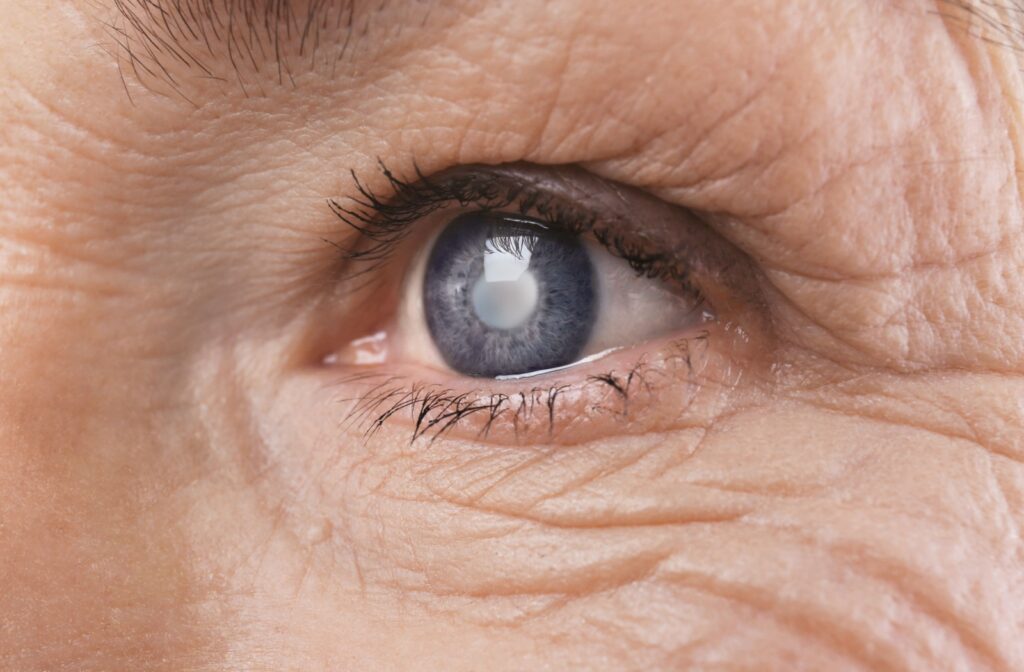Driving home after sunset, you might notice that streetlights and oncoming headlights have bright halos. Or perhaps you find yourself needing more light in order to read. These subtle changes in how you see in low light can be easy to dismiss, but they point to an underlying change in your eyes—and suggest that you might need an eye exam.
When it comes to seeing clearly in the dark, the health of your eye plays a significant role. That’s why cataracts affect your ability to see at night. This happens when cataracts cause clouding of the lens of your eye, causing light to scatter and reducing the clarity of your vision.
The Link Between Cataracts & Night Vision
Think of the natural lens in your eye as similar to a camera lens. Its job is to bend and focus light onto the retina at the back of your eye so you can see a sharp, clear picture. This process works well when the lens is transparent.
A cataract develops when proteins in the lens begin to clump together, creating a cloudy or opaque area. This cloudiness prevents light from passing through the lens cleanly. Instead of being focused precisely, light scatters in different directions.
This scattering effect is much more pronounced in low-light environments. At night, your pupils dilate to let in more light, which can increase the amount of glare you experience from sources like headlights. The result is blurry vision and difficulty distinguishing objects in the dark.
Signs Your Night Vision Is Affected by Cataracts
The changes from cataracts often happen slowly over months or even years. You might not realize how much your vision has been affected until the symptoms become more obvious. Pay attention to these common signs, particularly after dark.
- Glare & Halos: You may see starbursts or rings of light around streetlights and car headlights, making night driving difficult.
- Difficulty with Low Light: You may find you need more and more light to perform tasks like reading a menu in a dimly lit restaurant.
- Faded Colors: Colors can appear less vibrant and more yellowed, almost as if you’re looking through a fogged-up window.
- Blurry Vision: Your vision in general may seem dim or indistinct. If you’re experiencing headaches with blurred vision, it’s particularly important to have it checked.
Because these changes are gradual, it’s common to adapt to them without realizing there’s an issue. Regular eye exams help track these subtle shifts in your vision. This allows for early detection and management.
How to See Better at Night with Cataracts
While cataracts are a progressive condition, you can take practical steps to manage the symptoms and improve your comfort, especially in the early stages. These tips can help you navigate low-light situations more easily.
Update Your Prescription
An accurate prescription for your glasses or contact lenses is a key first step. Even a small change in your prescription can sharpen your vision and help you make the most of the light that enters your eyes. An up-to-date prescription helps you see as clearly as possible in all conditions.
During an eye exam, we can determine the most precise prescription for your current needs. This adjustment can sometimes be enough to reduce blurriness and improve your visual comfort. It helps your eyes focus light more effectively, counteracting some of the scattering caused by cataracts.
Use Brighter Lights at Home
Increasing the amount of light in your home can make a significant difference. Try using higher-wattage bulbs in your lamps and overhead fixtures, particularly in areas where you read or perform detailed tasks. Good lighting can help compensate for the dimming effect of cataracts.
Task lighting, like a focused lamp next to your favorite chair, can be very helpful. Also, consider adding nightlights in hallways, bathrooms, and bedrooms. This can improve your safety and mobility around the house after dark.
Reduce Glare on the Road
Glare from oncoming traffic is one of the biggest challenges for drivers with cataracts. Keeping your car’s windshield—both inside and out—spotlessly clean can reduce light scatter. The same applies to your eyeglasses, so make sure to clean them regularly.
You can also talk to your eye care professional about anti-glare coatings for your eyeglass lenses. These coatings are designed to reduce reflections from light sources, which may help lessen the intensity of halos and starbursts. Adjusting your car’s rearview mirror to the “night” setting can also dim the brightness from cars behind you.
Other Reasons for Poor Night Vision
While cataracts are a frequent cause of night vision problems, they’re not the only possibility. Other eye conditions, such as macular degeneration, can also affect your ability to see clearly in the dark. It’s important not to assume the cause without a professional evaluation.
A comprehensive eye exam is the most direct way to understand what is causing your vision changes. Your eye doctor can provide you with clear answers and discuss your options.

How Cataract Removal Can Help Your Vision
As cataracts progress, they can start to interfere more significantly with activities you enjoy, like driving at night or reading. When this happens, your eye doctor may talk with you about the different types of cataracts and whether surgery is a suitable option. Cataract surgery is a common and effective procedure that replaces the cloudy natural lens with a clear, artificial one.
This procedure is designed to restore clarity and address the vision problems caused by cataracts. By removing the source of the light scattering, many people find their vision returns to how it was before cataracts developed. This can lead to a renewed sense of independence and confidence.
What to Expect with Vision Improvement
After the cloudy lens is replaced, you should see an improvement in the quality of your vision. Colors can appear brighter and more vivid, and your overall vision can become sharper. The new lens focuses light properly, which can dramatically reduce glare and halos.
This improvement is often most noticeable at night. Activities like driving after dark should become more comfortable again.
Keep Your Vision Clear
Your vision is a vital part of your everyday life. Regular eye examinations allow your optometrist to monitor for conditions like cataracts and track any changes over time. They’re a simple and important part of your overall wellness routine.
If you’ve noticed any of the signs we’ve discussed or have concerns about your night vision, let’s talk. At Total Vision Ladera Ranch, we’re here to support your family’s eye health. Your eye doctor is ready to help you see your world more clearly, so schedule your consultation with our team today.



